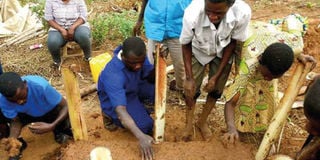Six Ugandan firms win Shs2b Sweden fund for clean energy

Participants are trained in energy saving technology by Green Bio Energy, a business whose focus is green energy. FILE PHOTO
Kampala- Six Ugandan companies have won a combined $0.6m (about Shs2.1 billion) from the Renewable Energy Challenge Fund - Clean Cooking Window, a Swedish embassy funded initiative.
The six; WANA Energy Solutions, Fenix International Uganda, Green Heat Uganda, Josa Green Technologies and Raising Gabdho Foundation (RGF), were the finalists among 60 companies that applied for the fund. The fund is premised on increasing access to renewable and efficient energy access for the poor households.
While meeting the winning companies last week in Kampala, the Swedish ambassador to Uganda, Mr Per Lindgarde, said their involvement in this initiative was informed by the rampant environmental degradation in the country where over 90 per cent derive their energy sources from biomass (mainly forests) which has exacerbated deforestation.
“We felt that it is very important for us to provide support for clean cooking. Clean cooking has positive effects to facilitate job creation, also gender equality that is also positive effect of our involvement,” he said.
“We do not have environment and climate change as priority focus areas [in Uganda now], but we are starting to work on a strategy for our development strategy for Uganda and most likely climate and environment will be key priority…,” he added.
The companies that won the cash make or trade in cleaning cooking technologies including solar, improved charcoal stocks, briquettes and Liquefied petroleum gas among others.
These technologies have been fronted by scientists as better alternatives to charcoal or firewood use which is increasing becoming scarce and expensive.
A recent survey on charcoal by the ministry of Energy, put 4961 metric tonnes of charcoal as being used in Uganda daily with Kampala consuming 837 metric tonnes per day during the dry season and 1,017 metric tonnes during the rainy season.
Ms Sarah Basemera, the executive officer of Raising Gabdho Foundation, a company that manufactures briquettes said the funding will help them spread out their activities especially in refugee communities and also create jobs.
Separately, Mr Ronald Kaggwa, the head production and trade planning at the National Planning Authority said by 2030, Uganda should have 4,500 megawatts of hydropower, solar energy of 5,000 megawatts, geothermal 1,500 megawats “and they should also have started nuclear energy production for energy purposes.
This Fund launched early this year will see the beneficiary companies also investing more than $500,000 (Shs1.8b). More than 700 women and youth are expected to have employment opportunities through these businesses.
More than 300,000 people are expected to benefit from having clean cooking solutions in homes, businesses or public institutions such as schools. More than 70,000 tonnes of Carbondioxide is expected to be offset as a result.



